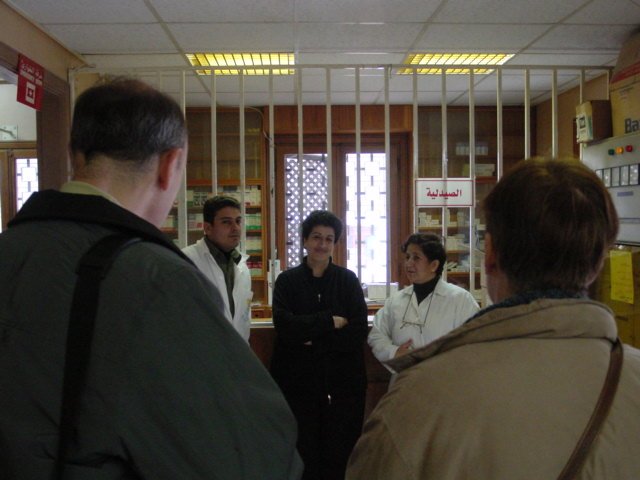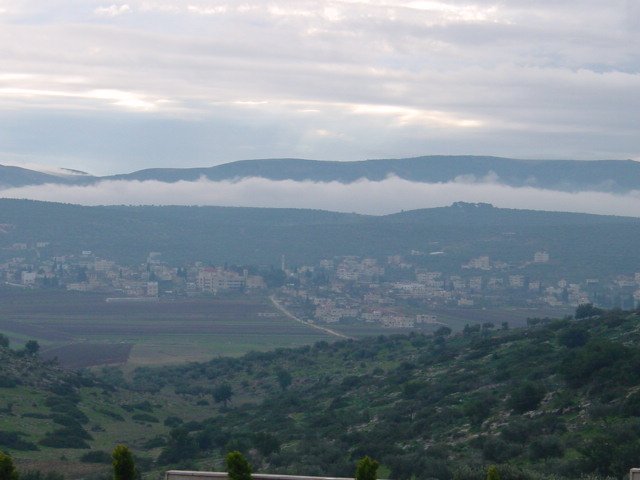January 20, 2003
We had a couple of visitors today (they seem to be coming in droves recently - a pre-war rush?). A Dutch organization called King's Highway has volunteers in the Middle East, posted in Egypt, Israel, Palestine, and Jordan. For four years they have had a nurse in Nablus with whom we have become good friends - she has left recently (the work in specialized hospitals is down to nearly nothing) for some months of training in South Africa, but she will be back. In the meantime, they are looking at bringing an additional volunteer to Zababdeh to work in the Anglican Clinic perhaps. It depends on many factors, but they came today to get a look and an idea.
Marthame waited for them at Jalame, at the northern edge of the West Bank, with a Zababdeh taxi driver. They shared a cup of coffee at the gas station along the main road, where a man from Zababdeh works (Zababdeh is everywhere). We talked about things past, things present, things to come. Nowadays, they were guessing that there are no more than fifteen settlers living in the area, based on the traffic they see passing. It is also forbidden to settlers to stop and buy their gas there, meaning their work is down to a crawl.
The gas station also houses a bridal shop, which is still doing brisk business these days. Arabs from the Galilee all come here to do their shopping - both for its quality and price. He also spoke about the situation in Jalame. Even now, some Jews come in to do business. Jalame is a safe place for Israelis, even soldiers and police, because its whole livelihood is based on being the West Bank portal to Israel. If an incident happens here, the economy here will be destroyed to nothingness - something people here can't risk.
A visit to Zababdeh’s Anglican health clinic.
Once the Dutch visitors came (folks we had met in Beirut), Marthame took them on a quick tour of Zababdeh. They got a chance to see the clinic, and to hear about the work there as well as possible needs. We then brought them to the school to meet Fr. Aktham and to bounce around the possibilities of teaching volunteers coming here to work.
The view of Zababdeh from the Arab-American University of Jenin.
The rain and the cold made walking around the village (not to mention sitting in our frost-bitten apartment) a bit undesirable, so we went up to the University for lunch, a view of Zababdeh, and to see what other possibilities could arise from introducing our visitors around. Even though students are home on break, we were lucky enough to catch the president in his office, just breaking up from a meeting. Having more internationals around would be nice.
Marthame went out in the evening to get an overdue haircut (did anyone think that phrase would be associated with Marthame?) and to catch up on the latest jokes from the barber (sorry, none of them can be repeated here). Our former neighbor, the son of an orphaned Greek national raised by nuns in the Galilee, he always has a slightly different take on things than most folks around here. The biggest problem with the Palestinians, he said, was their willingness to go around checkpoints. "Instead, we should just go and wait. One day, two days, three days, eventually they'll let us through. What would they do if a few hundred of us just sat there and waited?" We've heard similar sentiment before, and a popular approach that would take such ideas seriously would look dangerously like mass non-violent resistance. It happens, especially in the Ramallah/Bethlehem/Jerusalem area. But these people still await a leader who can galvanize the public in the way that Gandhi and King did. And as in pre-independence India and pre-integration South, some adopt violent strategies while a majority of people are immersed in the struggle to survive rather than the struggle for freedom.


